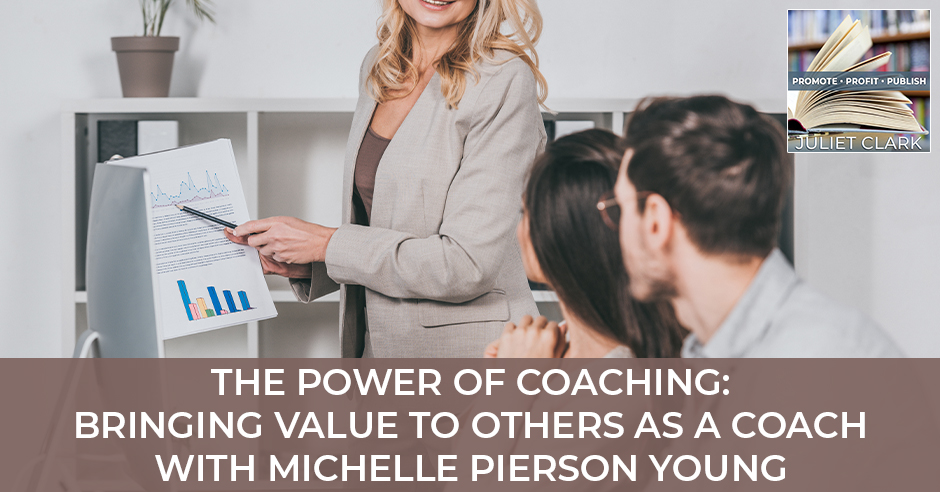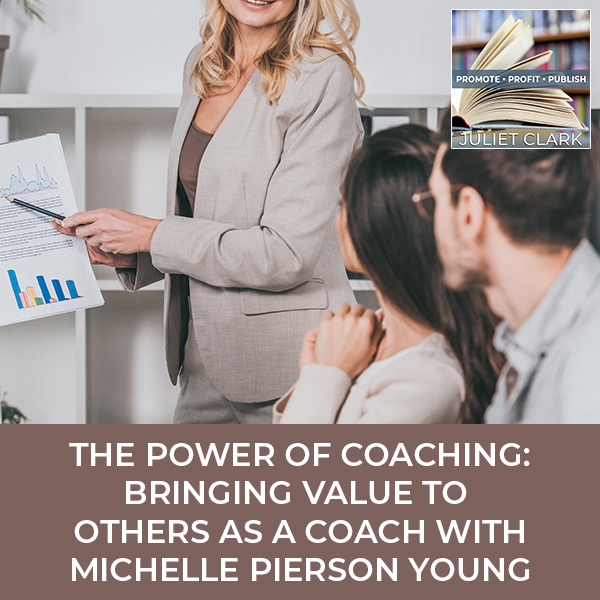
When we work with our innate talents and abilities, we become happier and more productive. However, in this day and age, being able to do that often comes as a luxury. Michelle Pierson Young is someone who can guide you to put your passions forward. As the Founder and President of Life Mastery Inc., she has helped many people discover ways to use their gifts through her impactful role as a high-performance leadership and executive coach. In this episode, Michelle gives an interesting talk about coaches, sharing how she became one and why coaches are essential. Find the confidence within and know that as a coach, you have the power to bring value to others.
—
Watch the episode here:
Listen to the podcast here:
The Power Of Coaching: Bringing Value To Others As A Coach with Michelle Pierson Young
Before we get started, I want to remind you to go over, if you’re a first-time reader or you haven’t gotten around to it, go take our Promote Profit Publish Quiz. You can find it at www.PromoteProfitPublishQuiz.com. Find out where your skill set is to the influencer status you’re looking for. Our guest is my friend, Michelle Pierson Young. She’s not only an independent woman, but she is the Founder and President of Life Mastery Inc. The company is built on the concept that when people discover how to use and are allowed to deploy their innate talents and abilities, they become happier and more productive for their employers, employees and themselves.
Some of her most impactful work has been one-on-one and group training in her role as a high-performance leadership and executive coach. Michelle has worked with a wide range of individuals from a fire chief of the Los Angeles Fire Department to a world-famous sculptor, doctors and CEOs. Michelle served as the Editor in Chief for the Women Network and was President of a multimillion-dollar corporation, has served in leadership for civic and non-profit groups and has been the host for a successful radio show. She also has worked on projects with such notables as John Maxwell and Clarissa Bert. Michelle is an accomplished writer and painter. She and her husband of many years, Aaron, have four children and a growing group of beautiful grandchildren. I want to find out why did you become a coach?
What’s fun for me is that I started studying personal development when I was fairly young, nineteen, twenty. I can’t remember exactly when I bought that first book, but I was tooling along in my life. It took a catastrophic event that was like out of the left-field for me. I didn’t see what was going to happen. My life went into chaos. Sometimes they tell the story it’s helpful. Sometimes I don’t. We’ve all had that experience in our lives going into chaos. It’s like I did not plan for this. It wasn’t in the recipe. What happened was when the dust settled and I was able to take a breath and look around, I realized that I was happy. At the same time, I had all of the ingredients for happiness in my life. I had meaningful connections. I had a meaningful service.
I had all of these different ingredients that make people go, “No, I had resources. Was it happy?” I was like, “What is up with this?” To make that very long story short, what happened was I dove deeper into my study, books, mentors and reading. What I discovered was absolutely life-altering for me. If you add that into, “I love teaching,” it’s one of my favorite things to do. I’ve been a teacher since I was in my early twenties. I thought, “It’s not fair that people don’t know this stuff,” because I had access to resources. I didn’t know some foundational principles to happiness. I was like, “I have it now. I’d love to share it.” That was the trajectory into what I do now. It was based on disappointment, looking at the world and going, “This is not what they sold me in the brochure. Where do I go for the good stuff?” That’s what I’m looking for.
What do you love about the coaching industry?
I live in the Pacific Northwest. I live in the middle of nowhere. My husband and I were sitting out on the breezeway, looking at this new horse he went and picked up, walked her, roamed around. If I was going to coach anybody out here, it would be the goats. I’m like, “Is that the way to treat one another.” Technology has allowed us not only as coaches to be able to broadcast ourselves but as individuals, we can connect to people that would not be available to us. In other words, everybody can have a coach whether or not they want to hire one, which I highly recommend. Also, we have access to so much information. Many people with such a broad range of life experiences that every single person reading this, they can reach out to you. They can reach out to me. There’s a whole smorgasbord of people that are available to us in this day and age. That is what I love about the coaching industry is that it’s a legitimate deal to be able to disseminate information going, “Where do you go for the good stuff?”
Who are your role models? Why did you get into all this? Was there a role model that propelled you?
When you know your stuff as a coach and when you bring that special sauce that is you, people will come to you. Share on XThis is a little bit, going back to that last question. Role models, for me, who I wanted to be wasn’t available to me on a one-on-one basis. The role models that I have is this broad spectrum of 70-something, the triple board-certified psychoanalyst is one of my main mentors too, Oprah Winfrey. The point is that all of these people are available. When my life took that total like I was getting sucked into a black hole. My role models were all of the people on The Secret, for real. I watched that movie many times that is okay. If the UK people are reading, I apologize. Many of those people, I know what they teach, I know what they are and who they are.
It was several years ago that I was immersing myself. I’d be having a bad day and there were a lot of those. I slipped the disc into my computer or watched it online. What’s fun is that I’ve met almost all of those people and know some of them quite personally now. It was like a manifestation. I’ve watched it so many times. I’ve memorized it so many times. Seriously, it was the weirdest thing I would run into these people. I spent the afternoon with Lisa Nichols. I held her bag and escorted her to the car. I had nice conversations with her. It keeps happening. Marie Diamond is a lovely friend. I spent time sitting and chatting. Those are the mentors, but they’ve come about because I was actively looking and going, “Who are these people? Who can I emulate?”
What are you most proud of in your career?
I love studying. The fact that the study that I was doing, because it was fun and it was interesting for me, has fed and informed. I’ve been able to teach thousands of people over the years. My finest moment, the thing that I’m most proud of, and it has to do with my career. It comes back to family because we all know it doesn’t matter how successful your career is. If the family is imploding or exploding or we can be successful at work and have everybody shower us with love. If we go home and it’s chaos at home, we’re not feeling that success elsewhere. My youngest son is like a lot of people. A lot of us who are raising kids, who have young adults now we’re like, “This kid doesn’t look like the kids I grew up with. This kid doesn’t act like the people we know. I don’t think he’s doing things that are successful.” Somebody said, “His youngest son was sleeping in late.”
He was not getting his homework done. He wasn’t showering. Because I’m studying so hard, I realized that every time we interacted, I was shaming him. I’d walk in and say, “Why aren’t you dressed? Why aren’t you out of bed? How come you haven’t mowed the lawn? Your teacher called me, why isn’t your homework done?” It was out of love except nobody receives love like that. Nobody’s like that. That felt good. My mom came and shamed me first thing when I woke up. The thing that I’m most proud of is I learned it because of my profession. I employed it with my son. Not going into the full story, but I influenced him to start working with me, not knowing if he would take it seriously. He did and in quick order.
The kid has not graduated from high school, but he is a successful university student in Japan, having gotten his GED, applied, and gotten a scholarship all on his own. It’s 100% him. I take as a coach. I don’t take any responsibility with that, but the principles that I taught him and the principles that I personally learned to stop shaming my son and give him love and requirements. It’s not like he wasn’t required to do anything, but give him love and say, “I see you. I love you. You’re awesome and also will you please do this or if you don’t do this, these are the consequences.” Honestly, he is in the LGBT community. We raised him in a conservative religion so that would have had repercussions. Because I changed my tune, I was like, “I see what I’m doing.” I saved his life. There will never be anything that eclipses that success for me no matter what.
I know a lot of you parents and Millennials are rolling your eyes because I know I did. When I was raised, even during the summer, we got up at 6:00 AM. Even though there was no school, we had to go do chores, whatever. We had to start the day at 6:00 AM whether the school was there or not. When my kids slept in, I was so worried that they’re not going to have a work ethic. They have a great work ethic. They just had to grow into it.

Power Of Coaching: It doesn’t matter how successful your career is if the family is imploding or exploding.
We don’t have to go on and on about Millennials, but I hate getting on social media. You see people going, “In my day,” and they’re espousing the beauty of when we were kids. First of all, our parents didn’t know how to allow us to be individuals. We were being created as machines. No offense to them, they didn’t know any better. This is how you raise a child. That’s what we thought. We start raising these children. My kids range in almost 32, almost 21. Between those few years, the whole world changed. We, as parents of these Millennial kids, didn’t know how to raise them. It’s a new world and everybody’s like, “This is how you raise kids.” That’s what personal development does is look at it and go, “What does that mean that he slept past 11:00 on a Saturday morning in the summer?” We get to evaluate it and go, “It doesn’t mean anything,” or “My kid does need this.” We don’t have a workbook for raising kids anymore except for we do when we pay attention.
I always judge like, “You got in late last night and you have to go to work now.” Almost the minute it’s about to come out of my mouth, I think, “How many times did you do that when you were 23, 24 or 25? Did you walk in from a partying night and shower and go to work?”
My husband and I were at the beach. Our middle son and his fiancé were hosting her mom at my house. She was coming into town and we weren’t here. I almost called my son to tell him what state the house needed to be in. We have a tradition of doing guest baskets when people come to stay with us. Basket with water and some snacks and stuff in it, maybe a note or a magazine. I called my son and I thought two things. My son is 24. I thought, “If he doesn’t do it, no big deal. It doesn’t mean anything.” It doesn’t mean we’re bad hostesses. It doesn’t make me look bad. It doesn’t make me look at anything. It doesn’t have anything to do with me.
Number two, this was exciting for me. I was like, “If he does do it, how proud I will be of him?” If I call him and tell him to do it, it’s going to take away what he already did. I was going to let it be. We got home and she was still here. Normally, I do a guest basket and I was going to say something about it. She’s like, “Max and Suzanne did the guest basket.” He started telling me what was in it. I’m like, “That’s way better than what I would have.” As parents, we get to leave it alone. Your kid comes in late and has work tomorrow. It’s like, “Be free. Good luck. Be tired at work or don’t go to work and get fired. It’s on you, but I believe in you.” It’s the most powerful thing we can do for them.
We were going to talk about the sales call. How did your first sales call go?
It was apologetic. It happened naturally. Coaches that are preparing to be coaches will have this happen. There was a woman that came. She’s an LA producer. She had her family in town. She wanted to come to have dinner with us. This is a friend of my husband’s business associate. She comes to dinner and we were sitting there. She was like, “Michelle, what are you up to?” She knew I was a coach. I’m telling her about my program. She was like, “What does it involve?” I was like, “I’m going to have to do this in preparation. I need to figure out the platform that I’m going to do.” She keeps asking me questions of this nature. I can tell she was getting more and more agitated.
She was getting mad at me. I was like, “I don’t understand what’s happening here.” Until the middle of dinner, she’d given me the stink eye and turned away in the middle of dinner. I was like, “What’s going on here?” I realize she was asking me what it would take for her to be in my next group. I kept telling her about what I do behind the scenes. She was violated. She was throwing her hands up in the air going, “Maybe I don’t want to work with this coach because she clearly doesn’t want to work with me.” She wrote me a check that night. That’s how my first sales call went or the sales conversation went. It wasn’t without a good deal of being obtuse.
When you have a good product, selling is serving. Share on XWhen you know your stuff as a coach, when you bring that special sauce that is you, people will come to you, people will want to invest in themselves with you. Anybody who’s reading this who’s like, “I’m super looking for sales advice,” pay attention to my words for the rest of our time. I will use very specific words that are important as you enroll your clients. People don’t want to pay you money. I don’t ever wake up in the morning and go, “Best Buy, I want to go give them some money. I bet they could give me a new iPad.” What I want to do is give them some money. Nobody ever does that. They want to invest in themselves saying, “My coaching program costs,” or even if you think you’ve got a whole lot of panache going on saying something like, “I’m one of the more expensive coaches,” is not going to dazzle anybody.
“You mean with you I get to spend more money and have fewer dollars in my bank account? Count me in, friend.” No. They want to invest in themselves. They want to receive value. I never have sales calls. I have enrollment conversations and these words matter. It matters for you. For the coaches who are reading or anybody who’s in sales, pay attention to those words. An enrollment call, bringing value, investing in yourself because that’s what people want. When you use those words with your own self, when you’re in the shower going, “I have an enrollment conversation. I want to bring their value and make their investment the most valuable I can.” It changes the way you speak when you do talk to them. Even you have to change those words in your mind for yourself.
Make it about service not selling.
When you have a good product, selling is serving. If you don’t tell people about that product because you’re like, “They probably wouldn’t want to,” you’re keeping something they very well may need in their life. You’re keeping it. It’s a selfish move not to offer it.
I shared my little selling with a lack of confidence with you. I’ll share it with these guys. I started a new program a couple of years ago and the price was $25,000. I was on my enrollment call and I stuttered not once but three flipping times getting $25,000 out. I didn’t have the confidence in what I was offering. What’s the key to getting that confidence? I have it by the way. I just don’t sell programs.
You’ve got panache all over the place. It’s about the things that I’ve talked about so far. It’s changing the words in your mind. Switching them around. I’m having enrollment conversations. It’s an investment. Everybody is like, “Don’t let your ego get in the way,” which I agree with the way that it’s being said. People think ego is when I say to you, “Juliet, investing with me is a $20,000 investment. This is what you will receive. These are the changes you can expect when you’re doing that.” The words matter. It was interesting. I had a conversation with a new client who did enroll with me. I quoted, “This is what it would look like.”
He was a one-on-one client. That’s a higher price point. Does anybody want to call me out on that? That is a bigger investment than a group call. It was interesting because I realized and I thought about it when you were telling me that story about stuttering because the opposite happened. I want to be clear that stuttering thing, been there, done that, seriously hardcore. I quoted his investment. I said, “This is the investment,” and I stopped. We all know that’s when you shut your mouth. Let them process. They’ll come back and they’ll talk to you. That’s one of the most powerful things is to sit back.

Power Of Coaching: A coach’s job is to be able to help you see what’s truly in front of you versus what you think is in front of you.
This is another important piece. If you’re a good coach because we know there are all kinds of coaches. When you know your stuff when you’re committed to bringing value, a valid question for somebody who’s like, “That’s a pretty steep price.” A powerful thing to ask them is, “What does it cost you not to make these changes?” What’s the real cost? Somebody might go, “I want to fix my car. That’s a $500 fix.” It will be fine, I can limp along.” They go along and the $500 fixed turns into a $5,000 fix. You’ve 10x what you would have spent anyway. Our lives are significantly more expensive than that. Think about it.
This is one of the fairly direct things I’d established rapport. Pay attention because you have to establish rapport. He’s like, “That’s quite the investment.” I said, “It’s significantly less expensive than a divorce.” Going back to ego, we all think somebody is going, “I’m the biggest game in town.” We think of that as being ego. It is because if I have to tell you I’m the biggest game in town, I’m clearly not. If you don’t know I’m a big deal, if I tell you, it doesn’t make me a big deal. The ego in it is if I say to myself, “Who am I to ask for this money?” That’s ego. The help that we can give to people isn’t necessarily in the areas where they’re successful.
If we look at somebody who’s very successful in business and go, “I’ve never done that.” I’m not that coach. I’m not coaching that person to be in their business in that way. I am perfectly capable of helping people in their relationships, helping them specifically with relationships with themselves and particularly in getting permission to love their lives finally. That’s an area of expertise. If I have so much ego in it going, “I want him to like me. Why would I say that pretty direct thing? I’m not looking out for his best interest. My job is not for you to like me. My job is for me to be able to help you see what’s truly in front of you versus what you think is in front of you.
I’m all about action. That’s why people hire me and the truth is, I’m going to tell you if that needs to be fixed and if you want to go pout about it for a while, great, but it needs to be fixed.
I tell my clients all the time when I say stuff. Rapport matters and the energy in which we say it. If I walk in and go, “Your life’s a train wreck,” then definitely don’t work with me. I’m a horrible human. That’s not the energy. My client and I will be working on something together and they will say something like, “I need to sit back and do what I need to do for other people. I don’t matter.” Highly evolved people will say those words. I’ve said similar things and it comes out of my mouth. What I’ll do is say, “Did you hear what you said?” I will verbatim repeat back to them what they said. They’ll be like, “Please.” They’ll be like, “You can tell me to go screw myself if you want because it wasn’t pleasant to hear that. I know that.” It’s the energy that we give it. It’s not judgmental that telling the truth and telling it kindly and saying, “There are possibilities. I see greatness for you is the gift that we give people.”
What do you do if you’re not good at sales? How do you get good at it?
Not good at sales is an idea that goes back to the confidence piece. It’s an idea. Change the words. If you’re not good at sales, be dedicated to enrolling clients. I love my enrollment calls. I will tell you straight up, without exception, every time I have an enrollment call, I get excited. This is why and this is what I’m inviting other coaches, other people who are selling services into this. The enrollment call is the only call we ever have. I spend the first 45 minutes bringing value to you. When somebody enrolls and says, “I would like to take your time and let’s talk about what that would look like.” I’m bringing my A-game for that first call and no matter how it goes at the end, I know that I brought value and that’s my first priority.
If you think you're not good at sales, make sure that you are excited about the people that you work with. Share on XMy second priority is to see if they’re a good fit because I suck at sales when somebody’s not a good fit for what I teach, I am no good at it. I’m awkward. I stutter. My energy will lower. Being authentic and going, “This person is not a good fit.” They might have their checkbook open or their credit card ready to wave at me or Apple Pay me instantaneously. If I’m out of authenticity, then it’s not. It’s a no. Be selective about who you’re going to enroll. I offer them books or other coaches. I refer people to other coaches all the time when they’re not a good fit for me. If you think you’re not good at sales, make sure that you are excited about the people that you work with.
Secondly, change the energy around it. It’s an enrollment call. First, you’re bringing value. It’s not a trick. It’s a life practice that I teach my clients as well as the coaches that I train. All was going into a situation with the expectation of the highest outcome. My expectation is that my conversation with you, Juliet, is going to be the highest outcome. I release any attachment to what that outcome looks like. If I have an enrollment call with somebody and they’re not a good fit for me. I’m not a good fit for them, or I see they’re a perfect fit, but at the end of the day, they don’t have internal permission to change, I go, “I hope they got something powerful.”
I literally have people that I’ve taken through the enrollment call that will shout me out on Facebook and tell people that I’m their coach. It’s the most interesting thing. They’ll be like, “My coach, Michelle, taught me this.” I’m like, “I have one call with you.” It was the enrollment call. They didn’t enroll, but two things happened. One, they clearly got value out of it. Two, I’m getting a shout out for it. Three, I without exception learn something from every single call I have. It’s always a win. You know that you’re always going to win on every single call. When you go in with that energy, that confidence, you’re good at enrolling clients, you’re good at bringing value. You don’t have to be a good salesperson.
Where can we find you?
You can find me at MichelleYoungCoaching.com. You can find me at MichelleAtPlay@Gmail.com. That’s my post personal apocalypse email address that I wanted to be. Who do I want to be for the rest of my life? I want to be Michelle At Play. You can find me on Gmail. You can also find me on Facebook at Michelle Young Coaching or Michelle Pierson Young.
Thank you so much for sharing with us.
Thanks for having me on, Juliet.
Important Links:
- www.PromoteProfitPublishQuiz.com
- Life Mastery Inc
- MichelleYoungCoaching.com
- MichelleAtPlay@Gmail.com
- Michelle Young Coaching – Facebook
- Michelle Pierson Young – Facebook
About Michelle Pierson Young
 Michelle Pierson Young is Founder and President of Life Mastery, Inc. The company is built on the concept that when people discover how to use and are allowed to deploy their innate talents and abilities, they become happier and more productive for their employers, employees and themselves. Some of her most impactful work has been 1:1 and group training in her role as a high performance, leadership and executive life coach. Michelle has worked with a wide range of clients from a Fire Chief of the Los Angeles Fire Department to a world-famous sculptor, from doctors s to CEOs.
Michelle Pierson Young is Founder and President of Life Mastery, Inc. The company is built on the concept that when people discover how to use and are allowed to deploy their innate talents and abilities, they become happier and more productive for their employers, employees and themselves. Some of her most impactful work has been 1:1 and group training in her role as a high performance, leadership and executive life coach. Michelle has worked with a wide range of clients from a Fire Chief of the Los Angeles Fire Department to a world-famous sculptor, from doctors s to CEOs.
Michelle served as the Editor in Chief for Women Network, was the president of a multimillion-dollar corporation, has served in leadership for civic and non-profit groups and has been the host a successful radio show. She has worked on projects for such notables as John Maxwell and Clarissa Burt.
Michelle is an accomplished writer and painter. She and her husband of 32 years, Aaron, have 4 children and a growing group of beautiful grandchildren.
Love the show? Subscribe, rate, review, and share!









Leave A Comment